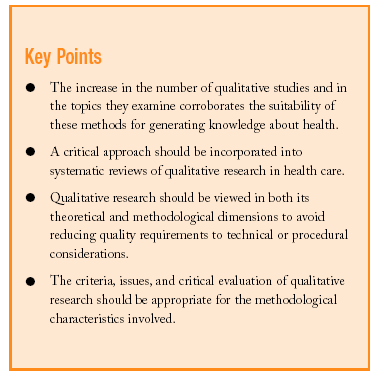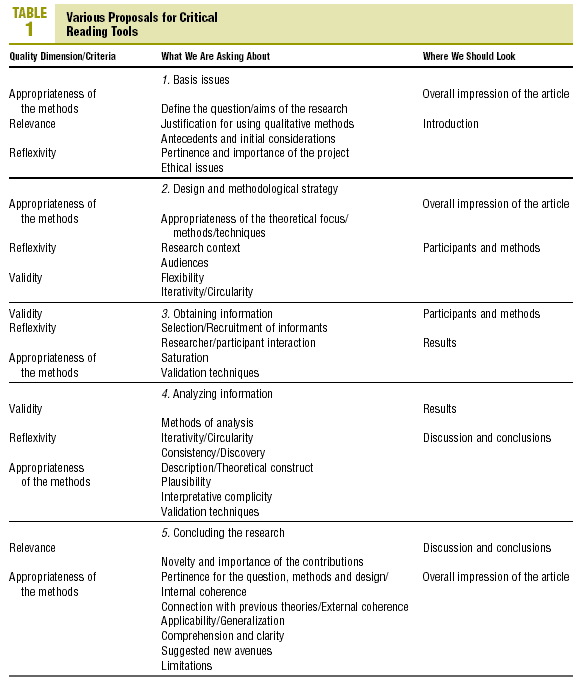The interesting review by Mira and colleagues of qualitative research (QR) studies published in Spain between 1997 and 2002 gives us (among its other contributions) an opportunity to raise a number of concerns and offer some reflections regarding the status of QR methods in health science research. The results of their review provide information about the types of QR methods used most frequently, the journals that publish the greatest numbers of studies of this type, the subjects investigated most often, and the authors who have produced the most such studies.
Their findings apparently confirm the trend toward increasing numbers of QR publications, especially in primary care and public health, although these studies still represent a small fraction of the total number of published articles. However, we should recall that because the authors limited their search to medical journals, this excluded articles published in the field of nursing, where QR productivity is similar to that in medicine.
As Mira and colleagues suggest, this increase has appeared somewhat later than in the English-speaking world, where QR has appeared regularly in well-known health care publications. Qualitative research in this setting has appeared in the form of monographs and special reports intended to provide public agencies with the criteria they need to use QR appropriately in developing and assessing policies in specific areas.1 Meanwhile, recent compilations published in Latin America have also revealed the existence (in Mexico and Brazil, for instance) of interesting research that has paradoxically been overlooked despite the cultural and linguistic similarities between these countries and Spain.2
Reasons that have been offered to explain why QR remains a minority approach in health sciences include the predominant trend in medical research to identify scientific knowledge with things that can be measured and expressed numerically, and fragmentation of knowledge as a result of the booming appearance of new specialties and subspecialties. An additional factor is probably the excessive emphasis on clinical practice that most health care professionals are immersed in, and which barely leaves time in their training and everyday activities for theoretical reflection and research.3
Under these circumstances the increase reported by Mira and colleagues in the number of QR publications and the subjects they are concerned with should be met with optimism, as it corroborates the opportunities for QR to generate knowledge in health care. However, this does not mean we should ignore the challenges remaining to be met at the present time, e.g., the comparatively low production of QR studies, and above all the enormous variability in their quality.4
In this sense Mira and colleagues are right to mention the importance of rigor and validity when QR methods are used in health science, although their analysis shows signs of a lack of critical evaluation of the studies chosen for inclusion. Although the authors did not expressly include evaluation of the quality of research among the aims of their review, this critical approach should be present in future systematic reviews of QR.
Of all topics related with qualitative methods, few have generated such a broad and varied range of studies as quality evaluation. The exhaustive review recently published by Spencer, Ritchie, and colleagues5 as the basis for their proposals to the Cabinet Office of the British Government Chief Social Researcher's Office, and the intriguing reflections by Eakin and Mykhalovskiy6 regarding the need for a "substantive" approach to evaluating QR in health sciences, are two particularly interesting contributions. For now the debate continues, and my only intention here is to offer a few comments on some aspects considered of relevance to the current status of QR in the health sciences.
First, QR is not always conceived as a particular view of theoretical and methodological knowledge of the real world, including health-related phenomena, but instead is often understood as a set of techniques (originating in
areas such as sociology, psychology or linguistics) which are also potentially useful in the health care setting.
This makes it appropriate for Mira and colleagues to emphasize that their analysis focuses on a differential methodological approach, in view of the difficulties involved in attempting to identify a common denominator that embraces the diversity of sources and developments in QR as a particular perspective on knowledge. Comparisons with quantitative methods are helpful in this sense, especially if they allow us to argue the pros and cons of both perspectives from a "complementarity by deficiency" viewpoint noted by Ortí, rather than from opposing positions or abstract assumptions that one is superior to the other.3
Moreover, accepting QR as a theoretical and methodological perspective is necessary to avoid the common trap of confusing the concepts of methodology, method and technique, and to avoid the tendency to reduce quality criteria to a more proficient or less proficient application of the latter.
Naturally, the rigor of the procedures used in QR is important. Indeed, there are not a few cases in which the process of selection of informants or the contexts to be observed, the degree of saturation achieved, the analytical model used, or the steps taken to ensure the validity of the study were not appropriate--with the consequent negative repercussions on the results of the research.
However, limiting a quality evaluation to procedural considerations such as the triangulations possible or the types of participants chosen may lead us to forget that the use of these procedures should always be based on specific, previously determined criteria that are defined and developed in accordance with the theoretical and methodological features inherent in the qualitative approach. For this reason, consideration of the so-called consensus techniques (such as nominal groups, the Delphi technique and the Philips 6/6 approach) as qualitative methods is questionable.
Many proposals have been made, and we cannot deny the difficulties encountered or the tentative nature of any attempt to arrive at common criteria in the face of multiple currents within QR. Nonetheless, a number of possible summary referents can aid in the design and use of qualitative evaluation instruments. These referents include the degree of methodological appropriateness and pertinence with regard to the question to be answered, the design, and the research process; relevance of the instrument for discovering new theoretical precepts or improving hypotheses; validity of the process of interpretation; and reflexivity with regard to the researcher's assumptions, ethical procedures and self-critical attitude.4
A number of critical reading instruments have been suggested by authors in Spain and elsewhere5,7 in the form of checklists or question guides. These aids are undoubtedly useful for reviewing qualitative studies. In general, these points are consistent with the items listed in the middle column of Table, arranged by phases in the research process. However, their interrelationships with specific levels of quality criteria are not univocal, nor is their applicability to different sections of the published article as a formalized manifestation of the research process.
The evaluation of QR is thus a systematic and dynamic process which should reflect the characteristics of qualitative methods such as flexibility, relevance for the context and the audience, circularity, and iterativity in both directions between the global and the particular. From this perspective, studies such as the one by Mira and colleagues should serve to help us develop increasingly appropriate criteria and questions for use in systematic reviews aimed at helping professionals to choose the qualitative information that best suits their needs. This, in turn, should improve the quality of qualitative research in the primary care setting.











